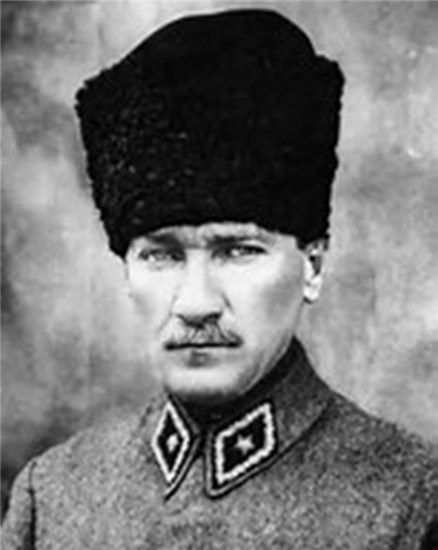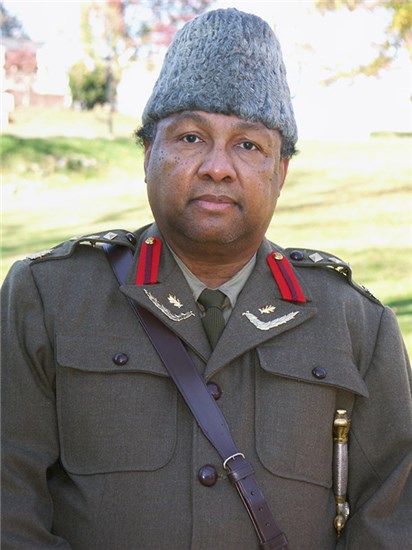

Mustafa 'Kemal' Ataturk (1881 - 1938)
by Dr. J. Holmes Armstead
Essay
Mustafa was born in 1881 in Salonika, then a thriving port of the Ottoman Empire. In the secondary school, he received the nickname of Kemal, meaning “The Perfect One,” from his mathematics teacher; he was thereafter known as Mustafa Kemal. This name, along with the connotations of perfection, became an early sign of the success and influence that Kemal would come to wield within his empire. In 1895 he attended military school in Monastir (now Bitola, Macedonia) where he made several new friends, including Ali Fethi (Okyar), who would later join him in the creation and development of the Turkish republic.
In September 1907, he joined the dominant government reform group, the Committee of Union and Progress (CUP), which had ties to the nationalist and reformist Young Turk movement. On April 23, 1909, the CUP took control and forced Sultan Abdülhamid II to abdicate empowered Enver Pasha, an enemy of Mustafa’s. Both became national heroes and leaders.
Mustafa Kemal now turned his attention from politics to military matters. He translated German infantry training manuals into Turkish, greatly increasing the effectiveness of the Ottoman military, whose might had waned considerably at the hands of rising European states. These reforms greatly increased his stance among his peers and subordinates alike, who now perceived him as the consummate military professional.
In October 1912, Mustafa was assigned to the defense of the Gallipoli Peninsula, an area of strategic importance, with respect to the Dardanelles. The Second Balkan War broke out in June 1913 and saw the Ottomans regain part of their lost territory. Mustafa Kemal’s former schoolmate Ali Fethi was named ambassador, and Mustafa Kemal accompanied him to Sofia as military attaché. There he was promoted to Lieutenant Colonel and was given command of 19th division on the Gallipoli Peninsula.
In February 1915 the Allies attempted their ill-fated landings at Gallipoli, and were thrown back in their attempt to force the Dardanelles. During the battle, Mustafa Kemal was hit by a piece of shrapnel, which lodged in the watch he carried in his breast pocket and thus failed to cause him serious injury. His success at Gallipoli thrust Mustafa Kemal onto the world scene. He was hailed as the “Savior of Istanbul” and was promoted to Colonel.
In 1916 Mustafa Kemal was assigned to the Russian front and promoted to general, acquiring the title of pasha. He was the only Turkish general to win any victories over the Russians on the Eastern Front. During the Russian Revolution, he was assigned to command the 7th Army in the Ottoman provinces of Syria and Iraq, where British forces were advancing from their base in Egypt.
For centuries the Turkish identity had been coerced and subjugated under the umbrella title of “Ottoman.” Now, a Turkish cultural identity was beginning to form and the figurehead and chief architect of this identity was rapidly proving to be Mustafa Kemal.
Modern Turkish history may be said to begin on the morning of May 19, 1919, with Mustafa Kemal’s landing at Samsun, on the Black Sea coast of Anatolia. So psychologically meaningful was this date for Mustafa Kemal that, when in later life he was asked to provide his date of birth for an encyclopedia article, he gave it as May 19, 1919. This served only to increase the popularity and standing of Kemal in the eyes of his Turkish public.
On July 23, 1919. Mustafa Kemal was elected head of the Erzurum Congress. Later known as the National Pact, it created a provisional government, revoked the special status arrangements for the minorities of the Ottoman Empire, and set up a steering committee, which then elected Mustafa Kemal as head. He continued to revise and change the country, making it a modern European republic launching a program of social and political reform, including abolition of all Islamic institutions, the introduction of western legal codes, modern dress, calendar, and replacing Arabic script with the Latin alphabet. Abroad he followed a policy of neutrality and pursued friendly relations with his neighbors. He emancipated women and allowed them to run for seats in parliament. These acts in his later life reflect the massive shift politically, culturally, and economically that Kemal oversaw. In a period of extreme change on both local and global landscapes, Kemal was able to orchestrate the creation of an identity and the foundation of an independent nation that had never before existed.
In 1935 when surnames were introduced, the Turkish parliament voted to give him the name Ataturk, or "Father of the Turks" along with the heartfelt thanks of a grateful nation. He died November 10,1938.
Recommended Reading
Mango, Andrew. Atatürk: The Biography of the Founder of Modern Turkey. Overlook Press, 2002.
Sofos, Umut Özkırımlı & Spyros A. Tormented By History: Nationalism in Greece and Turkey. Columbia University Press, 2008.
Dr. J. Holmes Armstead
Dr. J. Holmes Armstead is a retired professor of Strategy and International law from the US Naval War College. He has taught international law, strategy and national security policy for nearly 40 years. Professor Armstead has served on faculties at Stanford University, Pepperdine University, the University of California. the University of Nevada, Southern University the US Naval Postgraduate School, Lewis University, the Virginia Military Institute and Washington and Lee University. He participated in negotiations enlarging NATO with the accession of Poland, Hungary, Slovenia, Slovakia, Albania, Latvia, Lithuania and Estonia. Jim has assisted in drafting constitutional reforms in Montenegro, South Africa, Poland, the Congo, and Lithuania and is currently Of Counsel to the American Bar Association Office of Human Rights. Dr. Armstead lectures on International law at the Austrian Academy of Higher Military Studies in Vienna.
Quotes
“My people are going to learn the principles of democracy the dictates of truth and the teachings of science. Superstition must go. Let them worship as they will, every man can follow his own conscience provided it does not interfere with sane reason or bid him act against the liberty of his fellow men.”
“Mankind is a single body and each nation a part of that body. We must never say ‘What does it matter to me if some part of the world is ailing?’ If there is such an illness, we must concern ourselves with it as though we were having that illness.
Timeline
1881 - Mustafa born in Salonika.
1899 - Entered the War College in Istanbul.
1902 - Graduated a second lieutenant in and ranking in the top 10 of his class of more than 450 students
1907 - Joined the dominant anti government group, the Committee of Union and Progress (CUP), which had ties to the nationalist and reformist Young Turk movement.
1912 - Assigned to the defense of the Gallipoli Peninsula, an area of strategic importance with respect to the Dardanelles.
1914 - Mustafa given command of 19th division on the Gallipoli Peninsula
1915 - Allies attempted their ill-fated landings at Gallipoli, during World War I. His success at Gallipoli thrust Mustafa Kemal onto the world scene. He was hailed as the “Savior of Istanbul” and was promoted to Colonel
1916 - Mustafa Kemal was assigned to the Russian front and promoted to general.
1917 - During the outbreak of the Russian Revolution, Mustafa Kemal was assigned to command the 7th Army in the Ottoman provinces of Syria and Iraq, where British forces were advancing from their base in Egypt.
1919 - Elected head of the Erzurum Congress.
1920 - The Ottoman state was greatly reduced in size by the Treaty of Sevres. Mustafa Kemal repudiated the treaty. Having received military aid from the Soviet Union, he set out to drive the Greeks from Anatolia and Thrace and to subdue the new Armenian state.
1923 - Founder and first president of the Republic of Turkey. Served until 1938.
1938 - Died on November 10